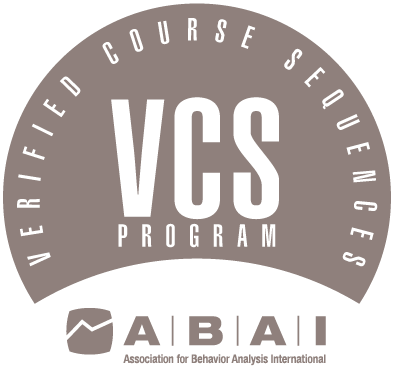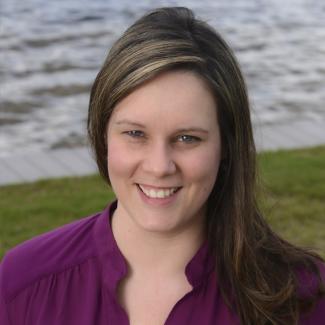Program Description


Program Mission
The mission of the program is to (a) provide students with a thorough understanding of the principles and applications of behavior analysis through coursework and experiential practica which allow students the opportunity to gain knowledge and experience across myriad settings; (b) to contribute to the discipline of behavior analysis and the community by preparing graduate students to become Board Certified Behavior Analysts; and, (c) to utilize research to develop useful solutions to social and behavioral problems
Program Objectives
Students will demonstrate mastery of basic principles and methods of behavior analysis via completion of ten courses earning a B-or better.
Students will demonstrate mastery of specific skills required by assistantship agencies via satisfactory ratings by those agencies.
Students will demonstrate proficiency in applying common methods of behavior analysis via a portfolio including examples of skill acquisition, preference assessment, functional assessment, functional analysis, reductive procedures, and staff training.
Students will demonstrate readiness to become Board Certified Behavior Analysts by passing a comprehensive exam with a score of at least 80%.
The Master's degree in Applied Behavior Analysis at the Panama City campus is accredited by the Association for Behavior Analysis International (ABAI) Accreditation Board. Our graduate curriculum and practicum have been verified by the Behavior Analyst Certification Board (BACB), which certifies professionals at the bachelor’s, master’s and doctoral levels. There are numerous settings for behavior analysis practicum experiences in the Panama City and Tallahassee areas that provide students with ample opportunities to practice their behavioral skills. The Early Childhood Autism Program (ECAP), based at the Panama City campus, is one of the opportunities. Currently, all students receive assistantships and tuition waivers through placement with approved behavior analytic agencies.
This is a 5-semester thesis-equivalent (CORE Project) program with a comprehensive exam at the end plus a Professional Portfolio demonstrating a wide variety of behavioral skills. Courses are taught by resident faculty from the Panama City campus and faculty from the Tallahassee campus. These courses are typically taught via Interactive Television Network, which allows students to live in either Panama City or Tallahassee. ABA faculty travel between the two campuses to ensure equal in-person contact at both locations. The program does evaluate and consider transfer credits when requested by graduate students.
Potential Careers
Board Certified Behavior Analysts (BCBA’s) are currently working in the following areas: autism, behavior and learning disorders, developmental disabilities, Performance Management, parent and child interactions, child abuse and neglect, behavioral safety, school consultation, curriculum development and evaluation, parent and staff training, and language development. BCBA’s can be self-employed, serve as educational or behavioral consultants for local or national consulting firms, work in residential settings, or be employed by the state.
Additional Resources
Masters Five Semester Calendar
Graduate Admissions
Handbook for current students
Financial aid
Financial Support
Currently, all students receive a tuition waiver via paid assistantship placements with approved behavior analytic agencies.
Admission Requirements
To be considered for admission a student must have attained a GPA (Grade Point Average) of at least 3.0 (on a 4.0 system) on all work attempted while registered as an upper-division student working toward a baccalaureate degree.
FSU PC does not require nationally standardized graduate admissions tests, such as GRE, for Master’s programs.
Experience applying the principles of applied behavior analysis in a real-world setting is preferred and in recent years applicants enter the program with 1 to 5 years of ABA experience. Students may be admitted from an allied field such as education, counseling or other related degrees. See below for the required prerequisite courses
A student must submit the following to be considered for admission:
- University Application for Admission to a graduate program at Florida State University and a $30 application fee.
- One official copy of transcripts from all colleges attended.
- Personal statement describing your experiences with behavior analysis and your career goals.
- Three letters of recommendation (at least two letters must be from faculty).
- Resume.
Students admitted to this program will be required to undergo federal and state criminal background checks prior to first semester registration. Positive results may change a student's admission status because of the practicum requirements of the program.
Prerequisite Courses
A minimum of 15-hours of undergraduate psychology courses is required, including:
- General Psychology 3 hours
- Developmental Psychology or the equivalent 3 hours
- Applied Behavior Analysis 3 hours
- Conditioning and Learning 3 hours
- Research Methods 3 hours
For the above courses, students must receive a grade of B- or higher. Students may apply to the program before completing the prerequisites but must complete them before beginning graduate coursework in the program.
Application Deadline: January 15th for Fall enrollment (the program does not offer spring and summer admission).
Applications must be made to Florida State University and to the Master's Program in ABA.
Course Requirements: A total of thirty-nine (39) hours are required to obtain a Master of Science Degree in Applied Behavior Analysis. All students must take the following courses and obtain a grade point of 2.75 (B-) or better for a course to be credited toward the department requirements. A grade point of 3.0 (B) is required for EAB5780. The semester in which courses are offered is subject to change. The Behavior Analyst Certification Board, Inc. has approved the following course sequence as meeting the coursework requirements for eligibility to take the Board Certified Behavior Analyst examination. Applicants will have to meet additional requirements to qualify to take the exam.
I. Basic Principles
- EAB 5700 Basic Principles of Behavior
- EAB 5701 Basic Methods of Applied Behavior Analysis (Spring)
II. Special Areas of Application Each student is required to complete four courses in areas of application that are the most fully researched and in which demand is greatest for professionals.
- EAB 5710 Behavior Analysis in Developmental Disabilities and Autism
- EAB 5711 Behavior Analysis in Mental Health and Aging
- EAB 5722 Behavior Analysis in Education
- EAB 5740 Behavior Analysis in Performance Management and Supervision
III. Theory and Research in Applied Behavior Analysis
- EAB 5708 Experimental Analysis of Behavior
- EAB 5796 Research Methods in Applied Behavior Analysis
- EAB 6130r Skinner’s Theory of Behaviorism
IV. Ethical and Professional Issues
- EAB 5780 Ethical & Professional Issues in Applied Behavior Analysis
V. Practicum
- EAB 5940 Applied Behavior Analysis Practicum
- EAB 5941 Applied Behavior Analysis Practicum
- EAB 5942 Applied Behavior Analysis Practicum
[Note: These are S/U graded courses that are taken sequentially. EAB 5941 and 5942 are taken after completion of EAB 5700, 5701, 5780 and 5940.]




